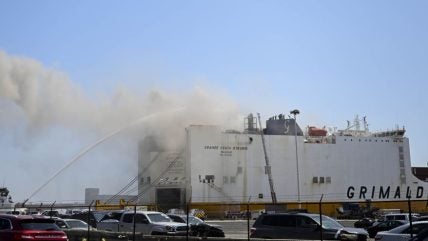
Cases of fires on container ships have increased in the past five years, and in response, the European Maritime Safety Agency (EMSA) employed the Danish Institute of Fire and Security Technology (DBI) to explore how the container shipping sector can improve its fire safety at sea.
The resulting CARGOSAFE report found that while container ship fires have doubled in 20 years, IMO rules and minimum guidelines on fire safety “do not seem to match today’s risk picture.”
The DBI published eight “cost-effective recommendations” which the IMO and EMSA said fell within the Formal Safety Assessment (FSA) framework, and could be considered for implementation.
With this approval the report’s recommendations will be used as the basis for a discussion at the IMO’s Subcommittee on Ship Systems and Equipment on 4-8 March.
“Changing the regulation for safety at sea is a process that takes many years. Therefore, it is especially gratifying to see that recommendations from the FSA-based approach have now reached the IMO SSE Subcommittee, which will make changes to SOLAS (the International Convention for the Safety of Life at Sea)” said Anders V. Kristensen, who project mananged CARGOSAFE for the DBI.
There are five steps to the FSA, starting with hazard identification, risk control options, and cost-benefit analysis, before recommendations are made.
How well do you really know your competitors?
Access the most comprehensive Company Profiles on the market, powered by GlobalData. Save hours of research. Gain competitive edge.

Thank you!
Your download email will arrive shortly
Not ready to buy yet? Download a free sample
We are confident about the unique quality of our Company Profiles. However, we want you to make the most beneficial decision for your business, so we offer a free sample that you can download by submitting the below form
By GlobalDataKristensen and DBI explained the cost analysis was “difficult to calculate”.
“All costs must be viewed in a holistic perspective,” they said.
“Every factor ranging from environmental costs to loss of human lives needs to be quantified, and since the maritime sector usually keeps such valuations confidential, this was also not an easy task.”
“Admittedly, it’s a difficult and complicated process, but the hard work pays off in the long run when the subsequent process goes much smoother,” Kristensen added.
Next steps
Although the report made 17 full recommendations, the SSE Committee will consider eight “boiled down” suggestions.
- Improved control of lashing
- Heat detection
- Portable IR cameras for crew to enhance manual detection
- Improved manual firefighting tools for individual container breaching and firefighting
- Manual firefighting tools that increase reach
- Methods for unmanned firefighting
- Active protection underneath hatch covers to protect from fire spread towards the deck
- Passive protection to protect from fire spread towards the deck
The DBI made clear “there is no such thing as ‘one size fits all’ solution” because the size and type of ship have a significant impact on the cost-effectiveness of the recommendations.
Infrared cameras and other tech-enabled heat or fire detection tools would improve onboard fire detection, which is currently based on only smoke detection on most ships.
While this type of solution would work best on feeder ships, the DBI said it would be less effective on container vessels due to the tight-packed holds on these ships.
Instead, greater attention should be given to fire control measures on container carrying vessels, including heavy equipment to breach a container when its contents has caught fire.







